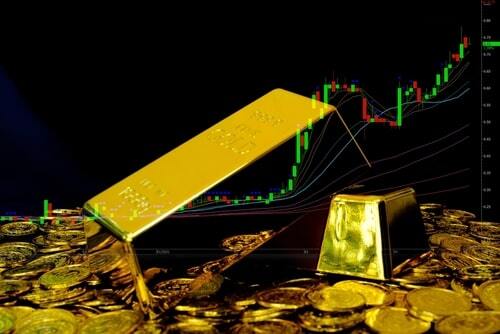
Gold price surges back to 6-month highs on mixed U.S. data, focus shifts to inflation next week
The latest macro data out of the U.S. pushed gold back to six-month highs after the U.S. economy and employment showed signs of cooling.
The gold market was at one point just $25 away from its key $1,900 an ounce level on Friday, with February Comex gold last at $1,873.40, up 2.4% on the week.
The biggest macro event of the week showed that the U.S. job growth slowed modestly in December, with U.S. nonfarm payrolls rising by 223,000 last month. The November data was revised down to 256,000 positions added.
One of the gold-positive drivers from the report was wage pressures coming down, which is a sign that inflation is cooling. Year-over-year average hourly earnings rose 4.6% last month. This was below markets' expectations of 5% and followed November's downwardly revised gain of 4.8%.
"Overall [the report] showed an economy slowly moderating with inflation coming down and labor market still strong. There is simply nothing recessionary about this report, but it was also a mixed report that had something for everyone," said MKS PAMP's head of metals strategy Nicky Shiels.
Also, the U.S. service sector contracted for the first time in 30 months in December, with the Services Purchasing Managers Index (PMI) reading coming in at 49.6%. The 6.9 percentage-point decline surprised to the downside as market consensus calls were looking for the index to come in at 55%.
"While recent tracking suggests that GDP growth held up much better than expected in Q4 last year, this decline in the ISM services will raise concerns that the economy was losing momentum quickly and could have started 2023 on a soft footing," said CIBC Capital Markets senior economist Andrew Grantham.
Gold surged in response to both data releases, hitting a daily high of $1,875.20 — the highest level since June. "Gold knee-jerked higher," said Shiels. "The steep declines in business activity and orders that, if sustained, creates concerns about the demand outlook."
Next week's performance is key
What gold does next will be vital in determining whether the precious metal can sustain its rally, Shiels added.
"Depending on whether gold can hold its weekly gains (which is looking increasingly likely), it solidifies the offensive way gold has been trading since it established a mild bull trend since early November – always looking for reasons to rally," she said Friday. "There's a decent amount of bullish 'pent-up' demand that has been rolled over from last year and can get ignited on the right data point (CPI & PCE) will be far more telling," Shiels said.
Gold began to show signs of a bullish pattern in the fourth quarter of 2022 on expectations of a pivot by the Federal Reserve.
The next target that gold needs to breach is around $1,896.50, which is the 61.8% retracement of the losses since last March's peak near $2,070, Bannockburn Global Forex managing director Marc Chandler told Kitco News.
"I am not convinced it makes it up there as momentum indicators are getting stretched, and I think the risk is greater than the around 1-in-3 chance that the Fed funds futures are pricing in of a 50 bp hike at the FOMC meeting that concludes on Feb 1," Chandler stated. "That said, as long as the yellow metal holds above the $1,825-$1,830 area, the upside looks favored."
After Friday's data, markets started to price in a 74.2% chance of a 25-basis-point rate hike in February, according to the CME's FedWatch Tool.
Gold has been anticipating and pricing in a slowdown in rate hikes by the Fed, but the ETF investors still need some convincing before the rally can really kick off, said Commerzbank analyst Barbara Lambrecht.
"Its upswing is presumably due primarily to more optimism among speculative financial investors, who are generally more fickle," Lambrecht wrote Friday. "However, any lasting recovery of prices on the gold market will require, above all, a shift in sentiment among ETF investors, who are still exercising caution. They appear to be waiting for the U.S. rate hike cycle to come to an end. In the short term, we envisage, if anything, a risk of setbacks on the gold market."
Data to watch
Inflation is one of the key reports that gold will pay close attention to next week, especially after the Fed minutes from the December meeting showed that U.S. central bank officials feel that more work needs to be done to battle price pressures.
"Federal Reserve officials remain concerned that policy needs to be more restrictive and to stay restrictive for a long period of time to ensure that demand moves into balance with the economy's supply capacity and price pressures subside," said ING chief international economist James Knightley.
Market consensus calls are looking for the annual inflation number to slow to 6.5% in December from November's 7.1% print.
Tuesday: Fed Chair Jerome Powell speaks on 'Central Bank Independence'
Thursday: CPI, U.S. jobless claims
Friday: Michigan consumer sentiment
By Anna Golubova
For Kitco News
David